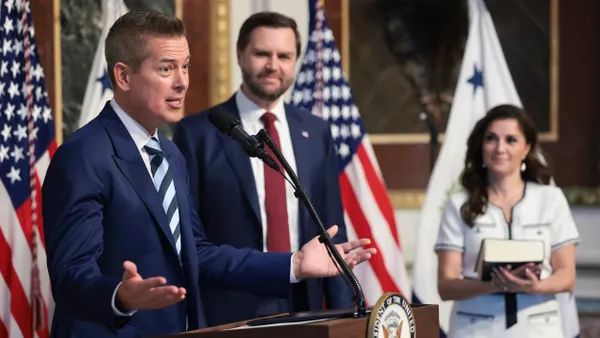Dive Brief:
- Three regional smart cities cooperatives in Arizona and Texas will form a multi-state cooperative effort to advance funding models and policies to promote new technology and development.
- The groups forming the new consortium are: the North Texas Innovation Alliance (NTXIA), a group of nearly 30 municipalities, agencies, corporations and schools across North Texas; The Connective, a public-private research and implementation partnership based in the Phoenix area; and the Southern Arizona Smart Region, a collective run by the Regional Partnering Center with nearly 30 public, private and academic members.
- "Just as a region as large and diverse as North Texas can benefit tremendously by connecting dots and learning from each other, it's a natural continuation for regions across the country (and globally) to partner to accelerate progress that serves our residents, businesses and visitors and prepares us for the future," Jen Sanders, co-founder and executive director of NTXIA, said in an email. She also said that more partners could sign on soon.
Dive Insight:
Regional partnerships have become increasingly popular as smaller communities navigate the fast-moving and expensive smart cities space. All three efforts were formed to help align public and private partners on policy and strategy, rather than having municipalities and agencies jump at appealing new technology. Dominic Papa, executive team member of The Connective and vice president of smart state initiatives at the Arizona Commerce Authority, said the new three-party group will bring that same approach across state borders, allowing members to share information and approaches.
"A pothole in Phoenix is similar to a pothole in Dallas; downtown parking challenges in Tucson are similar to downtown parking challenges in Scottsdale, data privacy issues faced by Plano are similar to data privacy issues faced by Gilbert. The list really can go on and on," Papa said in an email. "The key to the success of this collaboration will be to NOT boil the ocean and focus on two to three strategic problems that are critical across all regions and have the political support to drive forward."
Among those problems, Papa said, are technology funding, mobility, data governance and digital equity and inclusion.
Both states have been leaders on smart cities deployment, especially on mobility. Arizona, for example, was an early adopter of fully autonomous vehicles and has allowed companies like Waymo and Uber to test self-driving cars on the road. Texas, likewise, has been a hub for autonomous vehicle testing and cities like Austin have attracted tech companies by helping to foster a friendly environment for deployment.
Farhad Moghimi, executive director of the Pima Association of Governments and leader of the Southern Arizona Smart Region, said the public-private partnerships have helped companies find new markets for technologies, while governments have found tech solutions for urban problems. "The biggest benefit is that exchange of ideas," Moghimi said.
The collaboration also comes amid a broad debate on infrastructure and technology from the federal government, which could bring new funding opportunities. The Biden administration is pushing a $1.2 billion bipartisan infrastructure package and smart cities advocates are working to integrate funding grants and technology policies into whatever package comes up for a vote.
The multi-state partnership will allow the variety of members to share information, experience and data around new technology. The three partners say they plan to explore and evaluate submissions from a NTXIA and Marketplace.city initiative seeking revenue-generating solutions for municipalities and regions, which they say could accelerate project priorities. The groups also plan to hold member education events, workshops and joint research opportunities.
"I have yet to speak to a city or region that says 'Man, I have too much money and too much time on my hands,' which speaks to the need for organizations like ours to pull together the best minds across sectors to work together and follow the North Star," said Sanders. "Collaboration both internal to organizations and across industries maximizes value and resources through an understanding of interoperability, single investments that hit multiple [key performance indicators] and prepare for future investments."










